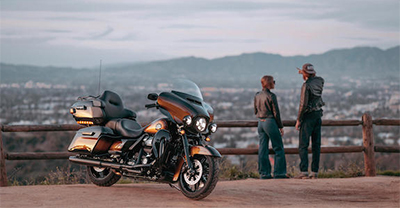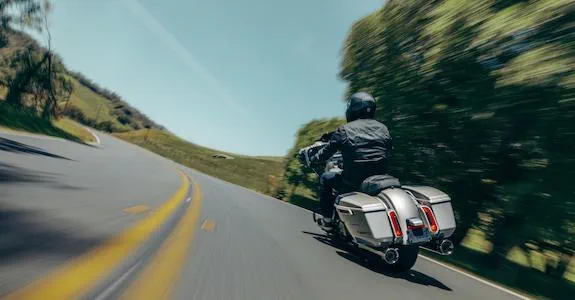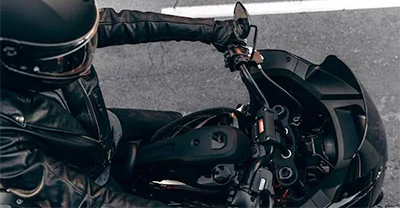If you're a young rider eager to hit the road on your motorcycle, obtaining insurance is crucial. The process involves researching providers, gathering information, selecting coverage, and purchasing a policy. Insurance costs for young riders are typically higher due to inexperience and higher risk, but strategies like shopping around, choosing a smaller engine bike, and completing a safety course can help lower premiums.
If you're a young rider ready to hit the open road on your motorcycle, we’re sure you’re excited to get on your bike! But there's one essential step you can't overlook: getting insurance.
Motorcycle insurance can protect you and your bike depending on the coverages you select. It also ensures you're riding legally in most states.
HOW DO I GET MOTORCYCLE INSURANCE AS A NEW RIDER?
The process of getting motorcycle insurance is straightforward. We’ll outline the steps below. But it’s important to understand the different terms, definitions and options so you know exactly what you’re paying for.
Here are the steps to follow:
1. Research Insurance Providers
Start by researching different insurance companies. Look for providers known for good customer service and competitive rates.
Here at Harley-Davidson Insurance, we have an outstanding reputation in the industry and we’ll be more than happy to help you find the perfect policy for you! We don’t only insure Harley-Davidson® bikes but many types of motorcycle brands. Click here to get a motorcycle insurance quote.
2. Gather Your Information
Have your personal details, motorcycle information, and riding experience ready. This includes your driver's license, bike make and model or VIN number, and any completed safety courses.
3. Choose Motorcycle Insurance Coverage
Decide on the loss coverage that fits your needs and budget. Remember, the cheapest option isn't always the best.
Here’s what to consider:
Evaluate your needs - Think about where and how often you ride. Do you use your bike daily for commuting, or is it just for weekend adventures? Frequent riders might need more comprehensive coverage.
Consider your budget - Balance your coverage needs with what you can afford. While it might be tempting to go for the cheapest policy, remember that lower premiums can sometimes mean less coverage.
Understand additional coverage types - Familiarize yourself with different types of coverage - liability, comprehensive, collision, medical payments, and uninsured motorist coverage. Each type offers different protections and understanding them helps you make an informed decision.
Read the fine print - Always read and review the policy details. Look for exclusions, coverage limits, and deductibles. This ensures there are no surprises if you need to make a claim.
4. Purchase A Policy
Once you’ve found the right policy, purchase it and ensure you have proof of insurance before hitting the road.
WHAT COVERAGE DOES A YOUNG MOTORCYCLE RIDER NEED?
When it comes to motorcycle insurance, young riders need to consider several types of coverage to ensure comprehensive protection. Here are the essential coverages you should investigate:
Liability Coverage
Liability coverage is often required by law and may cover bodily injury and property damage you might cause to others in the event of an insurance incident. It is essential to meet most state's minimum legal requirements.
Comprehensive Coverage
Comprehensive coverage may protect your motorcycle against theft, vandalism, fire, and other non-collision-related damages. It's like a safety net for those unexpected events that can happen off the road.
Collision Coverage
Collision coverage may take care of damages to your motorcycle resulting from a crash, whether it's with another vehicle or an object like a tree or a fence. This coverage is crucial for getting your bike repaired or replaced after an insurance incident.
Medical Payments Coverage
Medical payment coverage may help pay for medical expenses if you or your passengers are injured in a mishap. This can include hospital bills, surgeries, and even rehabilitation costs.
Uninsured Motorist Coverage
Uninsured motorist coverage comes into play if you're involved in an incident with a driver who doesn't have insurance. It can cover medical expenses, lost wages, and other damages. Considering one in seven motorists in the U.S. are uninsured1, this coverage is a wise choice.
HOW MUCH DOES MOTORCYCLE INSURANCE FOR FIRST-TIME RIDERS COST?
The cost of motorcycle insurance for first-time riders can vary widely based on several factors, including your age, location, type of bike, and the coverage level you choose.
For example, in January 2024, ValuePenguin reported that the average cost of motorcycle insurance for a 16-year-old was $103 per month2, while the average cost for a 20-year-old was $62 per month3.
Factors like a clean driving record, completion of a motorcycle safety course, and choosing a bike with a smaller engine may help lower these costs.
WHY MOTORCYCLE INSURANCE COSTS ARE HIGH FOR YOUNG RIDERS
We know it can be frustrating when you receive your quote and it’s higher than what your parents might pay. So, why are motorcycle insurance costs higher for young riders?
Inexperience - Young riders have less riding experience, which statistically makes them more likely to be involved in a claim incident.
Higher risk - Insurance companies may view young riders as high-risk customers due to the higher insurance incident rates among this age group.
Expensive claims - Incidents involving younger riders often result in more severe injuries and higher claim amounts, leading to higher premiums.
YOUNG RIDERS: TIPS FOR LOWERING BIKE INSURANCE PREMIUMS
High insurance premiums can be frustrating, but don't worry; there are ways to lower those costs.
Shop Around
Don’t settle for the first quote you get. Different motorcycle insurance companies offer different rates, so shopping around can help you find the best deal. Compare quotes from multiple providers to ensure you're getting the best liability coverage selections at the best price.
Smaller Engine
Choosing a motorcycle with a smaller engine can reduce your insurance premiums. Sport bikes with larger engines are often associated with higher speeds and greater risks, leading to higher insurance costs. You might wish to opt for a bike with a smaller engine which may keep your premiums lower.
Abide By The Law
This might seem obvious, but abiding by traffic laws can save you a lot on insurance. Traffic violations can increase your premiums. Maintain a clean driving record to keep your insurance costs as low as possible.
Bike Safety
Investing in safety features for your bike can also help lower your insurance premiums. Anti-theft devices, anti-lock brakes, and other safety enhancements make your bike safer and less likely to be stolen, which can lead to lower insurance rates.
Avoid Insurance Incidents
While it might be easier said than done, avoiding claim events is key to keeping your insurance premiums low. Ride defensively, stay alert, and always follow safety guidelines.
Improve Your Qualifications
Completing a motorcycle safety course not only makes you a better rider but can also lower your insurance premiums. Many insurance companies offer a range of discounts to riders who have completed these courses. Plus, the skills you learn can help you avoid hazards.
WRAPPING UP
As a young rider, the importance of quality motorcycle insurance cannot be ignored. Take your time to assess the different policies out there to find the best one for you. It’s also well worth considering taking a safety course which may lower your premium.
Related Reading:

Discover the key questions to ask your motorcycle insurance agent to help you understand your policy, coverage, and costs, ensuring you're fully protected.

Discover the risks and potential consequences of letting your motorcycle insurance lapse. Contact Harley-Davidson® Insurance to get a quote today!

Does your motorcycle insurance need to cost as much as you’re spending? Find out if you’re missing out on some insurance discounts you could be eligible for.

The insurance logistics to test ride a motorcycle can be complicated if there is an unforeseen motorcycle incident. Here’s everything you need to know.
*Data accuracy is subject to this article's publication date.
[1] https://insurance-research.org/sites/default/files/downloads/Uninsured%20Motorists%20News%20Release%201031_0.pdf
[2] https://www.valuepenguin.com/motorcycle-insurance-price-for-16-year-old#:~:text=How%20much%20is%20motorcycle%20insurance,theft%20statistics%20in%20your%20area
[3] https://www.valuepenguin.com/motorcycle-insurance-price-20-year-olds#:~:text=Is%20motorcycle%20insurance%20cheaper%20than,based%20on%20where%20you%20live



